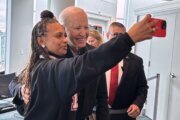This article was republished with permission from WTOP’s news partners at Maryland Matters. Sign up for Maryland Matters’ free email subscription today.
This content was republished with permission from WTOP’s news partners at Maryland Matters. Sign up for Maryland Matters’ free email subscription today.
A national conservative group that promotes the development of clean energy has set up a chapter in Maryland and plans to work with property owners and local governments to build large-scale solar and wind installations on private land here.
With its entry into Maryland, the 4-year-old Land & Liberty Coalition is planting a flag in its 12th state, and aims to bring more conservatives into the conversation about how to expand clean energy development in the U.S.
“We recognize an opportunity for more conservative voices to be in the conversation,” Jackson Keith, the director of the Land & Liberty Coalition, said in an interview. “For a while there’s been little to no conservative support for these clean energy and energy efficiency projects. We hope to elevate those [conservative] voices into the process.”
The Land & Liberty Coalition describes itself as a grass-roots organization that provides information to and partners with policymakers, landowners and clean energy advocates, including environmental groups. Over the next few months, leaders of the group plan to reach out to a range of stakeholders, especially owners of large tracts of land, such as farmers, to promote the idea that private lands in rural areas are ideal for wind turbines, large solar arrays and other renewable energy installations.
Leaders of the group say they may be able to tout the benefits of renewable energy or energy efficiency projects to local officials and landowners in ways that environmentalists and more liberal political leaders can’t.
“What we’re trying to do is cut through the noise and reach out to the communities where these projects are being proposed,” Keith said. “Our goal in three to five years is for counties to advocate for these projects.”
The Land & Liberty Coalition is an offshoot of a broader national nonprofit organization known as the Conservative Energy Network. That group launched in Michigan in 2015 and went national a year later. It was started by a seasoned national Republican strategist based in Lansing, Mich., Mark Pischea, who saw political peril for conservative policymakers who opposed clean energy projects, and felt there were ways to apply free-market principles to the energy policy debate.
“They’re interested in an all-of-the-above approach to clean energy and a sensible approach to solving the climate crisis at the state and local level,” said Charles Hernick, vice president of Policy and Advocacy for Citizens for Responsible Energy Solutions, a free-market clean energy organization focused on national policy in Washington, D.C.
Hernick, an Annapolis resident, said he he’s seen the Land & Liberty Coalition focusing its efforts on red states and conservative local governments.
“I think they’re interested in learning about what are the economic drivers in a community that will lead to a thumbs-up or a thumbs-down for a particular clean energy project,” he said.
While IRS forms submitted by the Conservative Energy Network showed the organization pulled in $4.1 million in donations in 2019, they do not spell out where the money came from. A spokesperson said the funding “comes from a variety of sources, including philanthropic grants, business and industry partnerships, and individual donors.”
The Land & Liberty Coalition currently has chapters in Illinois, Indiana, Iowa, Kentucky, Minnesota, Ohio, Pennsylvania, Texas, Virginia and Wisconsin, in addition to Michigan. Leaders of the group said rural areas in Maryland seem like fertile territory for the coalition because the state already has an emerging clean energy economy, powered in part by offshore wind development off the coast of Ocean City, and because the Hogan administration and the General Assembly have explored ways to establish a process for siting large energy installations on private land.
“Maryland presents a terrific opportunity for market-based, competitive and sustainable clean energy projects,” said Brian A. Sailer, a consultant to the Maryland Land & Liberty Coalition chapter who lives in Annapolis and is a co-founder of a government affairs firm in Washington. Sailer previously served as a board member of the Chesapeake Regional Tech Council.
“State and local businesses, governments and stakeholder groups are determined to execute on strategic investments in clean energy,” he said.
Also aiding the group’s initial launch into Maryland is Adam Dubitsky, who runs his own communications and government affairs shop and is a former policy and campaign adviser to Gov. Lawrence J. Hogan Jr. (R).
But it’s possible the Land & Liberty Coalition may encounter some resistance as its leaders begin their public outreach.
Colby Ferguson, director of government and public relations for the Maryland Farm Bureau, and Jay Falstad, executive director of the Queen Anne’s Conservation Association, both said placing large energy installations on undeveloped rural land could potentially diminish what fertile farmland is left.
Ferguson said his the association’s concern with where to locate solar projects is that there “is little to no restriction of siting on the prime and productive farmland.
“We would like to see these facilities be put on the marginal land so we aren’t sacrificing our food growing land for producing electricity,” he said.
Falstad said there’s a dilemma between wanting to preserve farmland and a desire “to do anything to help the environment” by building clean energy projects.
It is those very concerns, Land & Liberty Coalition organizers said, that they want to address. They anticipate hiring grass-roots organizers in Maryland to go out into the communities, beginning on the Eastern Shore, to initiate these kinds of discussions.
“We’re looking forward to engaging,” Sailer said.







